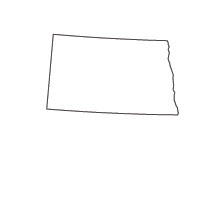North Dakota’s cities offer many opportunities for a rewarding career in opticianry. Working as an optician will involve taking measurements for eyeglasses, fitting lenses into eyeglass frames, adjusting eyeglasses, and repairing eyewear. As an optician, you will also play an educative role when advising customers on how best to maintain their eyewear. To practice as an optician in North Dakota, you must meet minimum educational and certification requirements, as outlined below.
as an optician will involve taking measurements for eyeglasses, fitting lenses into eyeglass frames, adjusting eyeglasses, and repairing eyewear. As an optician, you will also play an educative role when advising customers on how best to maintain their eyewear. To practice as an optician in North Dakota, you must meet minimum educational and certification requirements, as outlined below.
Optician Education Requirements in North Dakota
The North Dakota State Board of Optometry requires all opticians to have earned a high school diploma or equivalent. Furthermore, optometric formal training is also a requirement for licensure. Training for the profession is provided by some vocational schools and certain community colleges. Vocational schools usually offer one-year certificate programs, which prepare students for an entry-level position in the field. Selected community colleges offer an associate’s degree in optometry. Educational programs in optometry cover various areas such as anatomy, eye physiology, eyewear maintenance, optical theory, and optical dispensing. Programs also impart technical skills to students that allow them to perform the practical duties of the profession. For licensure purposes, it is important to select a school that has been accredited by the Accreditation Council on Optometric Education of the American Optometric Association.
Featured Programs:
- Online
Optician School and Certification Requirements
Certification for opticians in North Dakota is performed by the North Dakota State Board of Optometry, through exams. Opticians who complete their formal education are certified for practice by successfully taking board-approved exams. Candidates for licensure are required to take the National Board of Examiners in Optometry (NBEO) administered exam, as well as a state law exam. Earning national certifications is a voluntary decision for opticians in North Dakota. However, to distinguish yourself in the industry, you may want to earn nationally recognized credentials from the American Board of Opticianry (ABO) and National Contact Lens Examiners (NCLE). Holding the ABO-NCLE certifications helps to enhance professional development.
Licensed Optician Requirements in North Dakota
Applicants for licensure must have earned a high school diploma or equivalent, in addition to completing a formal educational program in optometry. Only programs that have been accredited by the Accreditation Council on Optometric Education are recognized by the North Dakota State Board of Optometry. Applicants for licensure must register to take the exam administered by the National Board of Examiners in Optometry (NBEO), and attain a pass score in Parts I, II and III. Applicants must also attain a pass score in the North Dakota Jurisprudence Examination, which is administered by the NBEO. Candidates are tested on Chapter 43-13 of the North Dakota Century Code and North Dakota Optometric Administrative Rules. Once granted a license, it remains active for three years.
Optician School and Continuing Education
Continuing education is a requirement to be met by all practicing opticians. In order to renew license, practicing opticians must demonstrate attendance of 50 classroom hours of continuing education. The North Dakota State Board of Optometry stipulates a maximum of 12 hours in the area of practice management, while a maximum of 12 hours can be by correspondence. One half of all continuing education must be in the area of therapeutic treatment and management of eye disease. The board maintains a list of board-approved providers of continuing education.
Optician Salary in North Dakota
The state average annual salary for dispensing opticians in North Dakota is about $40,000. In Bismarck, the capital, the annual salary ranges between $36,000 and $47,000. In Fargo, with a population of about 105,000, the annual salary for the profession ranges between $37,000 and $49,000. The median annual salary for opticians in Minot is about $39,000, while in Grand Forks, the median annual salary is about $33,000. In the smaller cities with a population of between 17,000 and 19,000, such as Dickinson and Mandan, the annual salary ranges between $35,000 and $46,000.
Professional Resources
Accreditation Council on Optometric Education
American Board of Opticianry (ABO) and National Contact Lens Examiners (NCLE)
National Board of Examiners in Optometry (NBEO)
